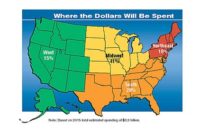Last month, I fulfilled a boyhood dream and visited Tanzania on safari. It was unforgettable, but I must say, there is nothing like visiting another country to make you appreciate home.
For example, we take for granted that our national parks are easily accessible to almost everyone. In Tanzania, the story is quite different. Roads vary from washboard gravel to unimproved ruts in the dirt. (There is some new pavement, but it was often built by foreign investors.) To visit the Serengeti or any of Tanzania’s magnificent national parks, expect a long, hot, bumpy and dusty journey. Driving requires nerves of steel; a heavy-duty, four-wheel-drive vehicle; and, in my case, multiple spare tires. That’s a shame, because it means most Tanzanians cannot enjoy their own parks.
The problem with taking things for granted is that it leads to complacency. Indeed, U.S. manufacturers are becoming increasingly concerned over our nation’s roads and bridges, transit and aviation systems, and ports and waterways.
According to a recent survey by the National Association of Manufacturers (NAM), most U.S. manufacturers believe our infrastructure is in fair or poor shape and that roads in particular are getting worse. Most respondents agreed that U.S. infrastructure will be unable to meet the competitive demands of a growing economy.
“This survey clearly demonstrates that our nation’s approach to investing in infrastructure is not improving at a pace to keep up with the growing needs of manufacturers,” says Jay Timmons, NAM’s president and CEO. “Our outdated roads, ports and inland waterways are in desperate need of repair and continue to add costs and complications as manufacturers move their products to market.”
The good news is that Congress has a chance to address neglect of our infrastructure and ensure that U.S. manufacturing remains competitive.
In July 2012, Congress passed the current infrastructure funding measure—the two-year, $105 billion Moving Ahead for Progress in the 21st Century Act (MAP-21)—after three years and 10 short-term extensions of the previous one. MAP-21 will expire Sept. 30, 2014, and Congress is now working to reauthorize the measure and build on its progress.
Any funding bill must address shortfalls in the Highway Trust Fund. Current predictions indicate the fund will be insolvent in 2015. The vast amount of investment needed for functional highway and transit programs is not something that states can shoulder on their own. If funding ceases, the entire manufacturing supply chain would be at risk.
A modern transportation system will provide more reliability for goods and people to reach their destinations, boost our nation’s economic competitiveness, and enhance the quality of life for all Americans. Moreover, investments in infrastructure will create jobs. For every $1 billion in federal investment in transportation infrastructure, some 27,800 to 34,800 jobs are created.
We urge Congress to pass this vital legislation. Let’s keep our nation moving.







